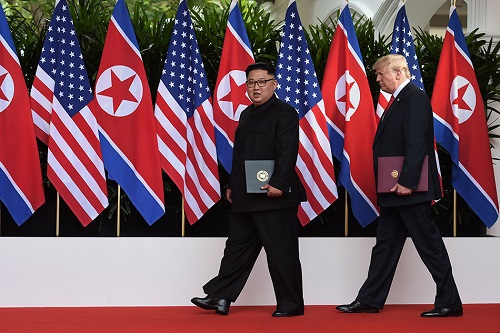Reuters photo
By
Tom Arms
The argy bargy over North Korea is part of a much bigger geopolitical battle. That is not to say the denuclearisation of an authoritarian and unstable rogue state such as North Korea is unimportant. It is vitally so.
But the prize at stake is huge– control of the Pacific East Rim. And what a prize it is. Excluding contender China, the combined GDP of the region is $12.9 trillion dollars and growing fast. The size of the market is one billion consumers.
For centuries the Pacific Rim was a Chinese lake and primary source of wealth for the Middle Kingdom. Then at the end of the 15th century, Europe simultaneously discovered America and the sea routes to Asia. The power axis shifted to the other end of the Eurasian land mass.
By the start of the 20th century China had slipped from producing an estimated 30 percent of the world’s wealth to a mere nine percent in 1913. After World War I an exhausted Europe faltered and a rising Japan and America competed to fill the vacuum. The Second World War and two atomic bombs settled that row.
Since 1945 the US has been the undisputed political, economic and military master of both sides of the Pacific. There was a blip called the Vietnam War, but the United States’ solid links elsewhere in the region remained intact and the US and Vietnam now enjoy good relations. America’s annual trade with the Eastern rim is worth nearly $900 billion a year. America’s next biggest trading partner is the EU at $720 billion a year.
In military terms, America’s position is protected by its Pacific Fleet with 200 ships, 2,000 aircraft and a quarter of a million naval and marine personnel. On the ground it has 39,000 soldiers in Japan and 23,500 in South Korea. Then there is the nuclear umbrella with 1,800 deployed warheads.
The Chinese are catching up fast on all fronts. But just how fast and how successful they are depends on their economic success. They need cash to compete, which is why they are starting to worry about Donald Trump’s tariffs and the resultant trade war.
The Trump Administration likes to portray its imposition of tariffs as protecting American industry from unfair Chinese trading practices. The reality is that a more fundamental geopolitical view of the world lies at the root of the Trump tariffs. It is that the real estate tycoon turned president believes in winner-takes-all zero sum competition rather than win/win cooperation.
US Secretary of State Mike Pompeo was in Beijing this past week to pressure the Chinese to push the North Koreans faster and further down the de-nuclearisation road. He was snubbed. Pompeo was denied the normal audience with President Xi Jinping and foreign minister Wang Yi largely ignored the North Korean issue to launch a barrage of complaints against American tariffs. The message was clear: Chinese cooperation on North Korea is tied to tariffs.
North Korea’s Kim Jong-un is dragging his de-nuclearisation feet. He wants US sanctions lifted before he trashes his bombs. The Trump Administration refuses to lift sanctions until the missiles are gone. The Chinese main aim is the withdrawal of American forces from the Korean Peninsula as this would be a key component in re-establishing Chinese hegemony in Asia—along with control of the strategic South and East China seas and the absorption of Taiwan.
The Chinese take the long view. Both back into history and forward into the future. They have long memories to match an ancient civilisation and that historical perspective tells them that patience, planning, hard work and the natural advantage of geography will restore them to their pre-eminent position in the region. Many diplomats believe that eventual Chinese success is an historic inevitability and that there is little alternative than learning to work with Beijing. Trump disagrees.
Tom Arms
I am a journalist, entrepreneur and historian with extensive experience in print, web and broadcast journalism. I started as a diplomatic correspondent, wrote several books (The Falklands Crisis, World Elections On File and the Encyclopedia of the Cold War), and then in 1987 started my own business (Future Events News Service, www.fensinformation.com) which over 25 years established itself as the world and UK media’s diary. Our strapline was: “We set the world’s news agenda.” I sold FENS in December 2012 but retained the exclusive broadcast rights to all of FENS data. To exploit these rights I set up LookAhead TV which produces unique programmes which “Broadcasts Tomorrow Today” so that viewers can “Plan to Participate.” LookAhead has appeared regularly on Vox Africa, Radio Tatras International, The Conversation and Voice of Africa Radio.
In addition to being a syndicated broadcaster and columnist on global affairs, Tom is also available for speaking engagements and can be contacted on Twitter, Linkedin and email: [email protected].



No Comments Yet!
You can be first to comment this post!